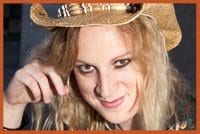“My life has been one big journey through corners on two-wheels and somersaults and near-death experiences,” says Mackenzie MacBride, the Ottawa-area singer-storyteller.
“I am a woman who got short-changed. I like to think that I have two angels and one of them is Patrick and the other one is Damian, and Damian is this rock and roll angel who temporarily forgot about me and ran off with some chick,” says MacBride. “All I ever set out to be in my life was a woman.
No prefixes, no suffixes, no multi-syllable qualifiers. And that disappoints some people when I talk like that. But I understand the difference between defining myself and being in the closet. I define myself but I am not in any closet.”
MacBride is certainly the character she purports to be. She is wearing a tight, frilly, orange and black, three-quarter length shirt, khaki capri pants and clunky oxfords, tied together vividly with a string of lime-green beads.
Hailing from the secluded shores of Minas Basin in rural Nova Scotia, MacBride is quick to explain that she was a poster child for all things queer while growing up. MacBride recalls attending Acadia University where she was menaced and intimidated by the general populace while walking through campus, and was eventually given security guards to escort her from the residence to the dining lounge. She also describes attending St Mary’s University in Halifax, where she spent her time alone in her foggy residence room listening to Melissa Etheridge. No one ever called her except her mother and one girlfriend. It was at this low point that MacBride decided that she was going to have to “give up or stand up.”
“The movie Hedwig And The Angry Inch paints a very brash, ‘snap-snap’ type of got-it-all-together bravado, but in real life it’s hard to be a person on the margin day in and day out,” says MacBride.
Moving to Ottawa was a wake-up call that helped MacBride realize that her eccentric character went far and beyond being part of the queer community.
“When I came up to Ottawa I was like, ‘Well, here everyone’s a tranny and everyone’s got a MySpace and there’s nothing special about you.’ It’s not my queerness that defines me as an eccentric artist; that’s just one little portion of me,” says MacBride, whose je ne sais quoi sets her apart even in the queer community. Despite being a self-described oddball, MacBride says that she still feels a lot of solidarity within the community.
“What keeps me coming is back is I feel like I have something to share with other queers. What’s true about me but not a lot of others in the queer community is that … it’s the queer way, to take our misfortunes and move forward. The survival instincts, transcending these hardships, is how I feel such a commonality with that community,” says MacBride.
MacBride says that one thing that hasn’t changed from living in the Maritimes is that she’s still a curiosity and still a source for scrutiny. And she still hears comments about the way she looks.
But major a conduit for MacBride is, of course, her music. The career was not easy to begin in Halifax – MacBride can remember calling every single performer in a pamphlet of musicians looking for gigs and being turned down by every single one. Being in Ottawa helped to advance MacBride’s career, and she was able to develop into her own.
MacBride says that what sets her apart is her storytelling and her witty yet earnest delivery – her way of sharing her struggles, minus the clichéd Hollywood happy-endings. MacBride says that her act is a mix of Tiny-Tim style screeches and Dolly Parton kitsch and camp. At each show, MacBride invites her audience to transcend the homogenous and the mainstream, and to experience the outlandish, the “off-off Broadway.”
“I do it with a style, and a depth of humanness you can’t get from every dime MC act. It’s not pretty, but it’s honest. I’m humble enough to take the risk to get up on stage and sing in that sexless voice, which could be thought of as social suicide, even by myself on some nights,” says MacBride.
MacBride hopes that her earnest vocals, lyrics and inexhaustible wit are enough to transcend all ages and social groups, and instill tenacity and perseverance in the face of hardship. According to MacBride, her music brings a lot of joy to those who have ever been “battered and beaten.”
“I want them to start making lemonade out of lemons, to treat each day as a chance instead of a promise. The biggest reward for me is when people come up to me after a show and say something like, ‘Wow, I don’t feel so alone now.’ I try to demonstrate beauty and love with honesty, outside of conventional clichés. Beauty as a barbed wire fence that has been cut open, not a kitten on a Hallmark Card.”
MacBride has enjoyed touring the Golden Triangle circuit this year, but has begun planning her own gigs. MacBride’s current project is a benefit called Rare Woman For Wild Birds for an Ottawa-area bird sanctuary that saves and cares for the injured animals. The benefit will feature other local female performers such as Casey Comeau, Amanda Rheaume and Ana Muira.

 Why you can trust Xtra
Why you can trust Xtra


